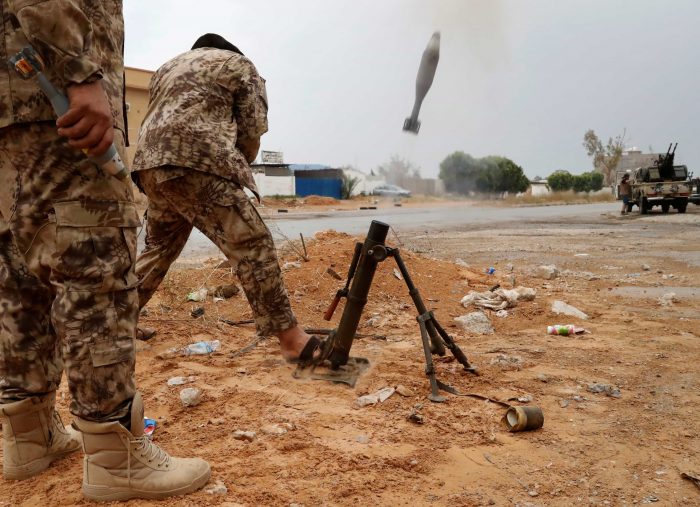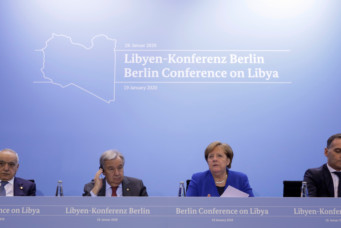Libya’s Dangerous Political Stalemate
Until now, most of the external actors involved in Libya relied on a Cold-War “zero sum game theory”, based on the dichotomic vision amicus/hostis (friend/enemy) of classical realpolitik. It is time this changes.

A fighter loyal to Libya’s U.N.-backed government fires a mortar during clashes with forces loyal to Khalifa Haftar on the outskirts of Tripoli, Libya, May 25, 2019. Goran Tomasevic/Reuters
Since mid-2014, when the ongoing low-level civil war erupted in Libya after the failure of the post-revolutionary political reconciliation process, the UN has vainly attempted to push competing Libyan factions toward a compromise. Different UN special envoys launched processes of reconciliation and accommodation that inevitably collided with a complex matrix of preconditions, disruptive postures by factions and leaders, personal ambitions and regional and international interferences.
The result has been a dangerous political stalemate: the extremely weak Government of National Accord (GNA) in Tripoli, backed by the UN and recognized internationally, has never been accepted by the House of Representatives (HoR) in Tobruk, dominated by General Khalifa Haftar, commander of the self-proclaimed Libyan National Army (LNA), and “ruler” of the eastern part of the country.
In early 2019, Haftar moved from his strongholds in Cyrenaica on the eastern coast and gained control of most of the Fezzan region in the south. In April, he took his adversaries by surprise when he launched an attack on Tripoli itself. The plan was to speedily conquer the capital, exploiting the discontent and division within the GNA camp, just before a new round of diplomatic meetings organized by UN Special Envoy Ghassan Salamé. Haftar hoped to present his move to the international community as a fait accompli.
However, he failed.
The LNA and their rivals, the forces supporting the GNA Prime Minister Fayez Mustafa Al-Sarraj, are currently stuck in a meaningless war of attrition, losing men, positions, and international credibility. Indeed, in Libya we are looking at a double impasse: a political one that has now provoked a military deadlock, denying in turn a new political initiative. Military escalation, refusals to accept a ceasefire or at least a truce, maximalist demands and preconditions, reciprocal de-legitimization and interferences in what risks becoming a new regional proxy war are paving the way for a protracted conflict, whose price will be paid by the civil population.
Not just stopping the clashes
The failure of any military solution should suggest to the parties that a return to the negotiating table is unavoidable. However, Prime Minister Al-Sarraj demands a complete withdrawal of LNA forces from western Libya, a condition which Haftar cannot accept since it would undermine his already shaken prestige and position. From his side, the general insists on depicting Tripoli authorities as hostages of a bunch of radical Islamists connected with “terrorists”.
In such a situation, all international attempts to end the current conflicts risk appearing futile. But this dangerous stalemate is entirely due to the lack of political will of the international community and the weakness of the UN, whose progressive decline in prestige and credibility is a geopolitical tragedy of the new century. Both the GNA and Haftar’s camp are heavily dependent on external political, economic and military support. However, they are fully confident that they still have the upper hand: although their supporters and patrons might—under certain conditions—pressure them into a ceasefire, they will not withdraw their support, or work for a comprehensive political agreement yet, since the geopolitical game their patrons are playing is more important than the stabilization of Libya.
And here we are facing the main obstacle which prevents the end of these clashes: that is, the fact that the international system is focusing on reaching a ceasefire without addressing the need for a new, comprehensive political and security architecture for Libya.
A new international political initiative
Despite its past failure and evident weakness, the UN format—formally and informally supported by other regional institutions such as the EU, the African Union and individual states—remains the pivot for a new political initiative to address the chaotic Libyan scenario. As is well known, the first step to start any de-escalation process is to address the perceptions of threat and basic needs of the factions involved. In this situation, it means convincing Haftar into a limited withdrawal from the Tripoli area, while providing him with guarantees of a balanced financial redistribution of oil revenues. This basic aim should be consolidated by means of a set of external confidence-building measures: organizing technologically hybrid monitoring mechanisms for respect of the ceasefire, establishing reliable early-warning systems, and reaffirming and enhancing the UN arms embargo.
Furthermore, this new initiative should not follow a top-down approach, but should try to involve all the stakeholders at the local level, as well as the traditional authorities. At the same time, since all past failed initiatives moved away from the political dimension, it might be wiser to start creating a consensus stemming from Libya’s resources, sponsoring cooperative oil exploitation and a balanced redistribution of revenues among the actors who accept this new reconciliation framework.
A new international attempt makes sense only if the countries currently using Libya as a proxy field understand that the Middle East does not need another Syria, Iraq or Yemen battleground and that no one will gain from a new military escalation. The unspoken corollary is that both Prime Minister Al-Sarraj and General Haftar should be forced to take a step back. Despite UN support, the selected prime minister of the GNA did not meet its expectations, barely leading a fragile and ineffective government. Therefore, while he can lead the country toward a new UN political process, he cannot represent the country’s political future, and should not hope to lead a future inclusive government.
At the same time, General Haftar once again demonstrated that he is not the solution to, but part of, Libya’s problems. The LNA is not a national army but just another faction, composed mostly of mercenaries and tribal members, and Haftar’s rhetoric about the war on terror cannot conceal his greed for power. He has benefited from wide regional and international support (Egypt, the UAE, Saudi Arabia, but also France, Russia and, more recently, President Donald Trump’s favor), which allowed him for years to paralyze the UN-sponsored process of reconciliation. His failed attack on the capital, just a few days before the opening of a new UN conference, has undoubtedly weakened his image and reputation.
It is also crucial to address the question of the proliferation of militias and their disruptive impact at every level of Libya’s institutional architecture: from the security perspective to the economic and financial. Not an easy task, indeed; in the past all attempts to rein in their powers and reduce their militant stances failed. However, there are examples from other peace-building processes showing that it is possible to reduce the militias’ entropic tendency, creating processes of institutionalization (already attempted in Libya in 2012 before the collapse of the first post-revolutionary government with the Shield and Supreme Security Council projects).
However, the focal point of this complex, multifarious process depends on a change of the strategic reading of the situation on the ground. Until now, most of the external actors relied on a sort of Cold-War “zero sum game theory” based on the dichotomic vision amicus/hostis (friend/enemy) of classical realpolitik. As a poisoning consequence, all attempts to create an inclusive political path that includes the actors perceived by their proxies as enemies have been opposed and undermined. This is a narrow-minded geopolitical perspective that has already spread sectarianism, factionalism, and radicalization all across the Middle East and has emphasized personal antagonism, ambitions and reactive stances among the competing Libyan factions.
It is often said that there is no room for delusion when we deal with geopolitical rivalries. Still, it is time for all international stakeholders to realize that without supporting a new, inclusive UN political process of reconciliation and stabilization, Libya might become another infective wound in the eroded fabric of the post-colonial Arab state system.
And no one will gain from it.
Riccardo Redaelli is both the director of the Center for Research on the Southern System and Wider Mediterranean and of the Master in Middle Eastern Studies at the Catholic University of the Sacred Heart in Milan, Italy. Since 2004, he has coordinated programs of national reconciliation and international cooperation in the Middle East.
Read More


